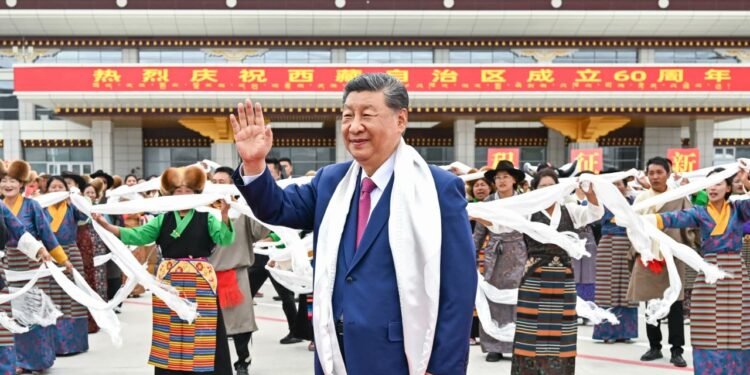BEIJING: Chinese President Xi Jinping arrived in Lhasa on Wednesday for his second visit as head of state, commemorating the 60th anniversary of the Tibet Autonomous Region’s founding, a politically sensitive milestone for Beijing.
Six years after the 14th Dalai Lama fled into exile in India following a failed uprising, the Communist Party established the Tibet Autonomous Region in 1965, the fifth and final such designation after Inner Mongolia, Xinjiang, Guangxi, and Ningxia. It was intended to grant local minorities greater autonomy, including religious freedom. But critics abroad describe Beijing’s rule as repressive, an accusation China firmly denies.
“To govern, stabilise and develop Tibet, the first thing is to maintain political stability, social stability, ethnic unity and religious harmony,” state media quoted Xi as telling senior Tibetan officials.
Xi last visited in July 2021, calling on Tibetans to “follow the party” in a trip widely seen as a show of confidence in Beijing’s grip on the restive region. The move came after waves of unrest, from the 2008 post-Olympics protests by monks and nuns to a string of self-immolations.
Xi reiterated that Tibetan Buddhism must adapt to socialism with Chinese characteristics.
Tibet’s geostrategic weight looms large in Beijing’s calculus, given its contested border with India and vast natural resources, including hydropower. His visit coincided with Chinese Foreign Minister Wang Yi’s rare trip to New Delhi, where both sides pledged to repair ties frayed since the deadly 2020 border clash.
China’s latest mega hydropower project in Tibet has drawn Indian concern downstream. Xi said the project must be pursued “vigorously” to meet carbon reduction targets while safeguarding Asia’s “water tower.”
Xi was joined by senior party leaders Wang Huning and Cai Qi, underscoring the significance of the anniversary. In 2015, Yu Zhengsheng, then the party’s top political advisor, presided over the 50th anniversary ceremonies in Tibet.
-WNN Desk



















